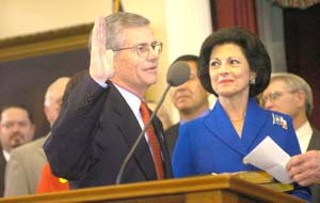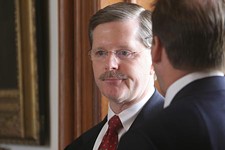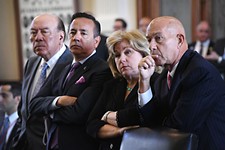Day One: Long on Smiles and Short on Dollars
On the Lege
By Amy Smith, Fri., Jan. 14, 2005

Batten down the hatches – as if the one two years ago weren't epic enough, state lawmakers are promising a 79th legislative session of "historic" proportions. House members, who during the last regular session (there've been several "specials" since) engaged in some of the most legendary partisan battles in Texas political history, demonstrated Tuesday that they can at least look back on those contentious days of '03 with a little (forced) laughter. In a public spirit of letting bygones be bygones, the round of ceremonial speeches on opening day carried bipartisan commitments to hunker down and pass reform measures needed to fix the school finance system as well as Child Protective Services and Adult Protective Services, all designated emergency legislative items by Gov. Rick Perry.
Inevitably, House members re-elected Speaker Tom Craddick, R-Midland, to a second term, despite a few wistfully bipartisan rumors last fall of replacing Craddick with one of the few moderate GOP voices left in the House. Raising a small dissenting note, Lon Burnam, D-Fort Worth, voted no, as he did in 2003 – but he was joined this time around by long-serving gadfly Paul Moreno, D-El Paso, and Houston Democrats Jessica Farrar and Joe Moreno. Eddie Rodriguez, D-Austin, abstained from the vote, as a form of protest against cuts made to social service programs under Craddick's leadership. "In good conscience I could not cast a vote in support of this Speaker because I do not believe that his record as our leader has worked to the benefit of the people in my district," said Rodriguez.
To a House overflowing with representatives' families and friends, Craddick accepted re-election with nothing but positive reinforcement. He glossed over the "few roadblocks" of 2003 by pointing out that members nevertheless balanced a budget (as required by law) and made "serious reforms" in homeowners insurance, tort reform, ethics, transportation, and higher education. "This session," he continued, "will go down in history because of tremendous success, as in the last session."
Likewise, Perry predicted the 79th session would be one for the books – "one that could go down as the most historic in modern times." The governor went on to extol the virtues of Craddick and to welcome the freshman class, noting that he himself had taken the oath of office for the first time 20 years ago to the day.

This year's crop of new faces includes Austin Democratic Rep. Mark Strama, officially seated Tuesday without the cloud of an election challenge filed but later withdrawn by now-former GOP Rep. Jack Stick, who still maintains that voting discrepancies marred the Dist. 50 contest. Before the swearing-in ceremony, Strama, wearing a wide smile, picked his way through the crowded House in search of his fiancée, Fox 7 News reporter Crystal Cottie. Other newcomers seated were Rep. Hubert Vo, D-Houston (who faces a challenge by veteran GOP Rep. Talmadge Heflin), and Melissa Noriega, who is standing in for her husband Richard Noriega, D-Houston, while he's on military duty in Iraq. Missing in action was San Antonio GOP Rep. Elizabeth Ames Jones, who this week became Perry's new appointee to the Texas Railroad Commission pending Senate approval, and whose seat will be filled by a special election.
On the Senate side, after a brief perturbation to dismiss a hell-hath-no-fury election challenge filed against Houston Democrat Mario Gallegos by his former mistress, members couldn't say enough good things about Sen. Florence Shapiro, R-Plano, before electing her president pro tem, the official second to Lt. Gov. David Dewhurst.
The cheerfulness of opening day stood in sharp contrast to Monday's tit-for-tat exchanges between Perry and Comptroller Carole Keeton Strayhorn. As an all-but-declared challenger to Perry's re-election run next year, Strayhorn used the occasion of her biennial budget forecast to attack the governor's record. The comptroller said legislators would have a "scant" $400 million extra to work with after meeting current spending levels, and that the state would have $64.7 billion in general revenue over the next two years. That means the Legislature will technically have $6.4 billion more in general revenue than was appropriated in the previous session, but Strayhorn said $6 billion of that is effectively already spent, in order to meet current spending levels on existing programs.
Still, the new budget estimates paint a far brighter economic picture than the gloomy $10 billion shortfall that greeted legislators in the previous session. In remarks that had all the trappings of a campaign stump speech, Strayhorn said, "Texas has just enough money to continue following Gov. Perry in doing a poor job for our citizens. It means that we could continue to follow the governor in balancing the budget right on the backs of our school teachers and our most vulnerable Texans with billions and billions of dollars in fees, charges, and out of pocket expenses – and avoid hard decisions about the future. But that's not what hard-working Texans want."
Perry press secretary Kathy Walt quickly counterattacked, pointing out that the surplus (such as it is) proves the governor was correct to focus efforts on creating new jobs. "If the comptroller wants to blame the governor for turning a $10 billion shortfall into a surplus in two short years," Walt said, "the governor will be happy to share the credit with legislators and employers who are working hard to grow our economy."
The Perry-Strayhorn sniping did manage to obscure an even larger shadow – the continuing unmet needs for education and social services across the state. Scott McCown, executive director of the Center for Public Policy Priorities, weighed in with his own analysis, noting that beyond funding existing programs, the revenue still falls $7 billion short of what's needed to restore the cuts made to children's health insurance and Medicaid in 2003 – not to mention the expanding needs of a burgeoning Texas population. But lawmakers' strong ideological aversion to new state taxes doesn't inspire confidence that they'll be able to pass a budget without another series of disastrous cuts to social services, McCown said. "People just aren't facing reality."
Got something to say on the subject? Send a letter to the editor.










